Mona Pasquil is vice president of MSHC Partners, where she mentors local government office holders who aspire to do more for their communities. She serves as a board member for My Sister’s House, the first and only non-profit organization to specifically identify and address the unique needs of women and children impacted by domestic violence in the Central Valley’s highly diverse Asian and Pacific Islander community.
Mona’s work for the California Senate, the California treasurer, the Democratic National Committee, and on President Clinton’s White House staff has provided her with the opportunity to affect social policy and
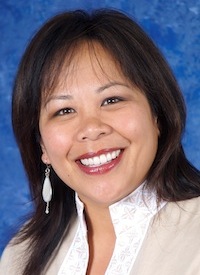
influence the political agenda on city, state and national levels. The ability to help push the envelope for others to be heard as well as giving a voice to the community is the fuel behind her efforts: “This has always been my passion, to address issues that face the community.”
Mona explained that her work with My Sister’s House is really about creating a safe environment, “to really make it a safer place” for the community at large. She states that it is the cultural context that makes the struggle within the culture sometimes difficult to break. It’s asking the question: “Why won’t people talk about domestic violence?” and coming to the realization that it is “difficult to talk about and difficult to expose. More people should understand that this is out there. It’s not something that should bring shame. Exposing and talking about it is part of the healing process.”
Having grown up within a supportive family, with role models in social work, and having “always had phenomenal woman mentors, I always remember that you bring others along with you,” in your journey. You
realize that “the everyday mocking that can ruin a spirit,” is lessened as a “sister helps to pick you up.”
“Sometimes there are things that happen to people” and it is knowing where you come from, knowing “how much has been sacrificed” that brings you along.
Tracking down
Sonia Delen isn’t an easy feat. If she’s not traveling for her job as a senior vice president at Banc of America Leasing, and she’s not at a board meeting of a non-profit, she’s likely home caring for her three sons, husband and extended family who all live in the same home. Year after year, she also devotes the considerable amount of time required to be a part of “The Vagina Monologues,” having been in the cast each year since the original 2004 production and contributing to the productions with behind the scenes support.
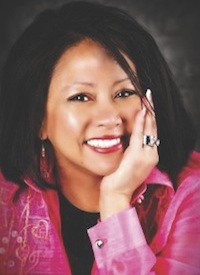
When Sonia joined the cast of “The Vagina Monologues” she wanted her young nieces to be involved. When a local radio reporter asked Sonia why she would allow minors in the show, she said that they can now know, at their young age, that no one can touch them inappropriately and these are lessons that can never be taught too early. Today, her niece Kai serves as a producer of FWN’s V-Day benefit productions.
The strength Sonia has today is a culmination of many tests and triumphs. When she first arrived in the United States as a 26-year-old, she was pregnant and single. Her son David was born blind, hearing impaired, and developmentally disabled. Adamant that she would not go on welfare in her new home country, Sonia found a job and raised David on her own for seven years. Since 1982, Sonia has been climbing the corporate ladder and today is the highest ranking Filipina in her company.
Sonia has been selected as one of FWN’s Remarkable Women, one of the Top 100 Most Influential Filipina Women in the United States, and served on the steering committee of the Filipina Summit in 2007. Even after nearly 20 years of marriage, Sonia’s eyes still get teary when she talks about her husband Chris Fitzsimmons, whom she credits for teaching her true honesty. She knows that relationships can help bring out the best in a woman, not pain and suffering. Sonia dedicates her life to making sure not one friend nor a Filipina has to live in an abusive home again.
Dr. Annalisa Enrile’s defining moment came at 19, when her friends held a mirror up to her bruised face and said, “This is what you look like. Is this what you want?”
With the support of her family, Annalisa walked away from an abusive relationship
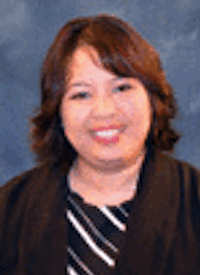
and has spent every day since working so that other women never feel pain. She and a friend created a program for high school students to talk about teen dating violence, but soon realized it is not enough to provide services to survivors. One has to stop abuse and violence before it starts.
After graduating from UCLA, Annalisa spent a year in the Philippines as a Fulbright Scholar studying the organization GABRIELA (General Assembly Binding women for Reform, Integrity, Equality, Leadership, and Action), Philippines’ grassroots efforts to create women’s empowerment in domestic violence settings and the effects of militarization, labor, colonization and imperialism on women and children. Her Ph.D. dissertation at UCLA examined the rise of Filipino adolescent suicide and its possible connections to domestic violence, rape, and abuse.
In 2007, Annalisa was one of three women detained by the Philippine government for nine days. Although the country is not supposed to have a blacklist, Annalisa and the other two women were held because they had been part of the human rights delegation to the Philippines the year before. It took a large and very active network of supporters, organizations, family members pushing U.S. officials, and the press, to put enough pressure on the government to get them out.
Last year’s detention re-focused Annalisa, as the national chairperson of GABnet, is a US-based multi-racial women’s solidarity mass organization, on the issues facing genuine women’s liberation around the world. Annalisa also uses her classroom in the USC School of Social Work to educate and advance the women’s movement.
She believes V-Day is the epitome of the strength of the women’s movement. “We must continue to use art and other creative methods to capture the hearts of people in a way they can accept.”
Despite her strong criticism of the Philippine government, Annalisa is very proud of her heritage. Her dedication, she says, comes from the collective spirit of strength of Filipina women.
M. Evelina Galang is the author of several books of fiction as well as the recipient of numerous awards. She has also been researching the lives of the women of Liga ng mga Lolang Pilipina, surviving Filipina “comfort women” of World War II, since 1998. An initial eight weeks of daily interactions with the Lolas in Manila (1999) resulted in an inspiring grandmother- granddaughter relationship, intensifying Evelina’s private commitment to elevate these surviving Filipina “comfort women’s” issues to the legislative level. Evelina co-authored a blog, “Laban for the Lolas!” in support of House Resolution 121, which was

passed on July 30, 2007. Resolution 121 called upon the Government of Japan to formally apologize and accept historical responsibility for their involvement. She was the Filipino American Outreach Coordinator for the 121 Coalition.
M. Evelina Galang is currently writing Lolas’ House: Women Living With War, stories of surviving Filipina “comfort women,” which has been constantly changing and evolving. The book documents not only the experiences of survivors and how they’ve overcome their past, but, Evelina says, “it’s also about my own relationship with them and what they’ve taught me about being a strong Pinay. Lolas’ House is a story about how these surviving Filipina “comfort women” changed so many lives, including my own.”
Evelina shares some of her insights from her advocacy work. “We should implement peace. We need to educate everyone about what war is and what war does. When we understand who we are as human beings and how great we are, we can also understand how horrible we can be . . . . These Lolas bring forth a very ‘giving’ legacy of empowerment, respect, dignity, and faith. Despite the horrible things they went through, when they are in a relationship with you, they are concerned about your love and happiness.” Evelina has recently been named by FWN as one of the 100 most influential Filipina women in the US. Aside from teaching in the MFA Creative Writing Program at the University of Miami, she has begun a U.S. chapter of Friends of Lolas at the same university, an advocacy group for “comfort women” of WWII.
“Our voice is already with us, at the very center of our hearts,” said Evelina, “Give it time and space to arise and be strong enough to let that voice ‘just be.’ Follow your intuition. Trust it.”
Being gracious and respectful and having a great sense of humor are
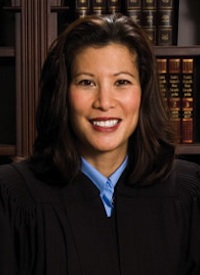
qualities that have helped make
Justice Tani Gorre Cantil-Sakauye stand out as a remarkable leader and trailblazer, as well as a barrier-breaking, history-making Filipina woman and Vagina Warrior.
In the last two decades, Tani has worked in Sacramento as a deputy district attorney, a member of Governor Deukmejian’s senior staff, a trial judge, and has been appointed to successively higher levels in the judiciary by Governors Deukmejian, Wilson, and Schwarzenegger.
In 1997 as a judge in the Sacramento Superior Court, Tani started and presided over the first court in Sacramento dedicated solely to domestic violence issues. She was also a member of the presiding judge’s task force on domestic violence.
Appointed in 2005 to California’s Court of Appeal, Third Appellate District, Tani is one of only two women and only one of two persons of color presently serving on this court, which has jurisdiction over appeals from 23 Northern California counties. Currently, she serves on the Judicial Council’s Task Force on Domestic Violence Practice and Procedure, which is charged with recommending changes to improve court practices and procedures in cases involving domestic violence allegations.
Tani attributes her uncommon success to her second-generation Filipina mother and the legacy of her strong Cebuana grandmother. “We were taught to see ourselves as leaders,” Tani recalls of her mother’s lessons. “I stand on the shoulders of my grandmother and my mother,” she declares. “I am here for someone to stand on my shoulders.”
From childhood acting cred
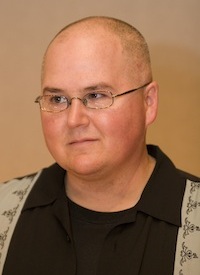
its in “The Waltons,” to working on “The Tonight Show” starring Johnny Carson, to an Emmy nomination,
Ken Marquis has had a long and exciting career. He says, however, his work the last three years as a director of the FWN’s “The Vagina Monologues” has a unique place in his heart. “I have witnessed or heard about the results of our efforts – which is no less than saving people’s lives.”
This transformative power of theatre is part of what brings Ken back year after year. Some love the theatre for entertainment and escapism, but Ken sees its ability to change people. In the case of V-Day, he can help change how people see the subject of violence against women. By attending the show, audience members can be part of the solution and part of the healing. They take away knowledge well beyond the one show.
Part of his role as director includes working with cast members and helping them find their own interpretations of the monologues. The words can be heart- wrenching and the experience emotional, but Ken says it is like watching a flower bloom. As cast members bring to life the messages of the monologues, they also find healing and empowerment within themselves. Ken says he is honored to be able to enhance the experience on both sides of the curtain with the knowledge that he has in production.
Ken’s day job as a team manager at the George P. Johnson Company means he is often traveling around the world, creating marketing events. He has also produced events and concerts around San Francisco including “Ginoong Pilipinas” at the Palace of Fine Arts and the main stage at the “Pistahan Dance and Music Festival.”
Despite his intense community participation, Ken says he’d “absolutely” come back work on “The Vagina Monologues” again. There are new friends, new interpretations and new audiences. And although some might consider this show outlandish, the topic of domestic violence is still not as widely discussed as it should be. All the hard work is worth it, if we can make a difference in one person’s life.

Anybody who meets
Ken Theisen today, arguably San Francisco’s senior-most activist against domestic violence, would have a hard time believing that he got into this by accident.
In 1981, Ken took a job in the family law department of Bay Area Legal Aid because it was the only one available. His plan was to spend a year in that position, then make a move over to the immigration law unit, his true passion at the time. On his first day, a survivor of domestic violence arrived at 9:30am and there were five more appointments lined up for later that day. Immigration law never had a chance.
In the nearly 30 years since then, Ken has dedicated his life to educating, improving and changing policy on nearly every facet of domestic violence. He is one of the co-founders of the San Francisco Cooperative Restraining Order Clinic and the California Coalition for Battered Women in Prison (today known as Free Battered Women).
Over the years, Ken has helped train thousands of staff and volunteers at agencies that assist survivors. He has also worked with the SFPD, judges, DAs, lawyers, students, and medical personnel on domestic violence issues. He has met with the last 4 mayors and the last 8 police chiefs. He’s not one to hold back his opinions and says, “I don’t care if they like me or not” just as long as he’s getting through to them.
Ken works extensively with the media to raise awareness about domestic violence. If his name isn’t on the byline of an article, op- ed piece or letter to the editor, he likely had a hand in an article, radio or television story on DV somewhere along the way.
He’s been around long enough to assist the second generation of many families and at least once, the third generation of a family. Despite this disheartening reality, Ken says he is driven by the strength of survivors who often have no idea how strong they are.
Nenette Flores speaks against domestic violence with much
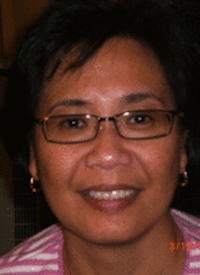
conviction and empathy because she knows whereof she speaks— the San Mateo County accounting officer survived not one but two abusive relationships.
Tears fall when she tells of the psychological, emotional, sexual and physical battery she endured from her husband in Manila and her second marriage here in the Bay Area. Family and friends helped her move on from her abusive relationship at the beginning and then she sought the support of CORA. Nenette went to counseling, group therapy and one-on- one mentoring, which all helped her reclaim her self-esteem.
Fiercely independent, she now identifies herself as a CORA Kumare, speaking out at community events to give hope to those suffering in silence and enlightenment to those who deny that domestic violence can happen to anyone.
“Continue to be aware of the signs and warnings of abuse,” she said, “Follow-thru with support groups, help other victims to realize the abuse and accept the fact that they are in an abusive relationship.”